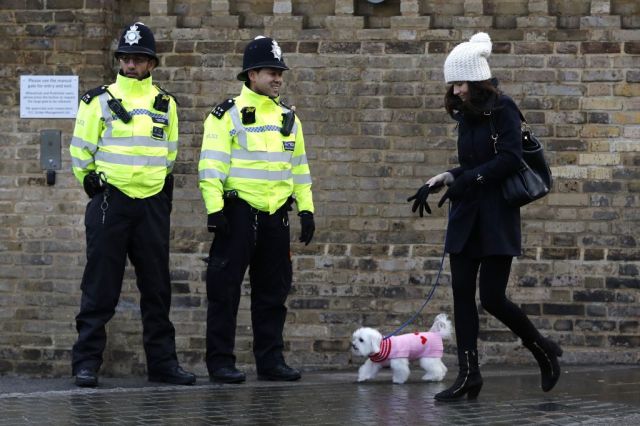
The spectacle of police drones chasing dog-walkers around the Peak District was a lockdown low-point for many of us — including former Supreme Court judge Lord Sumption whose trenchant intervention yesterday appears to have been heeded.
But whatever your feeling about police tactics, you might be interested to know what the recently enacted law on staying at home actually says, and where the ambiguities are. As irritating experts like to say on Twitter, “here goes”.
First, the Regulations create a new criminal offence of leaving your home without a reasonable excuse. The maximum sentence is an unlimited fine. The police can offer you a Fixed Penalty Notice instead of prosecuting you, but if they prefer to take you to court – in order to boast about it on Twitter for instance – that’s entirely up to them.
What’s a reasonable excuse? Well, the reasonable excuse defence “includes” 13 listed examples: obtaining basic necessities, taking exercise, helping the vulnerable, and so on. The excuses on the list all begin with “the need to…”, so if you want to rely on a listed reasonable excuse you’ll need to “need to” do that thing as opposed to merely wanting to do it.
And that’s the first ambiguity: “includes”. Is it an exhaustive list or can you go off-menu for your excuses? The answer is that other excuses are capable of being reasonable excuses but my guess is they didn’t want to advertise the fact. “Includes” on its own is not enough to create a exhaustive list in criminal legislation. But can we currently rely on individual police officers and PCSOs to understand it in that way? Of course not. Visiting a parent terminally ill with cancer, to say goodbye? Not on the list.
What about walking the dog? Well, buying food for him is on the list, but there’s nothing about taking him for a walk, so if that’s your only reason for leaving the house you might have to take your chances at court. One way round this of course is to stretch the dog’s legs at the same time as your own. And there’s nothing to stop a very well-trained dog going for a walk by himself.
How much exercise can you do, and where can you do it? The list of reasonable excuses includes “a need to take exercise” but says nothing about where, how often or for how long. This is where the Guidance on social distancing might come in. The Government’s Guidance says “once a day” and “stay local”, but isn’t part of the law. So if you leave home in order to exercise in the Lake District 30 miles away, you haven’t broken the law provided that you had a “need to take exercise” and that was your reason for leaving. But a lockdown-loving Magistrate could easily interpret “need to take exercise” with reference to the Guidance and find that you had no reasonable excuse.
But as you might have already spotted, the offence only relates to leaving home. Once you’ve left home — with, say, a cast-iron reasonable excuse of delivering paracetamol to a sick friend — could you stop at a park bench on your way back and smoke two or three large cigars? Or if you were an MP delivering essentials to your elderly parents and you stopped for a quick at-a-distance chat, would that be an offence?
On any ordinary reading of the Regulations you could smoke and chat yourself silly, but I wouldn’t be at all surprised if, on an egregious set of facts, a Court took a “purposive” approach and interpreted “leaving your home” as a sort of continuing act so that you would need a reasonable excuse for everything you did elsewhere. (There’s precedent for it in how the courts deal with robbery, if you’re interested).
But the real key to all this lies in the unusually wide powers granted to the police and PCSOs. If an officer “considers” — i.e. believes, rightly or wrongly — that you have left home without a reasonable excuse, they can, if they believe it to be necessary, do any of these three things: give you “reasonable instructions”, tell you to go home, or use reasonable force to get you home. And if you ignore or obstruct any of that, you commit an offence — even if you did actually have a reasonable excuse for leaving home and the officer is badly wrong in thinking you didn’t (perhaps because he or she wrongly believes that there can be no off-list reasonable excuses).
Having said all that, there is one good reason to think a bit of flexibility was envisaged: the inclusion of off-licences in the list of businesses permitted to stay open. Few would argue that alcohol is a basic necessity, but it could, in certain circumstances (a big wedding anniversary perhaps, or just that you’ve run clean out yet again) amount to an off-list reasonable excuse. And if not, perhaps a short detour via the wine shop after delivering medicine is legally permissible after all.
But if a cop tells you to go home, home is where you better go — no matter how wrong about the law or facts he may be — unless you want to risk prosecution or an extra-judicial Twitter shaming. The Metropolitan police under Cressida Dick seem to have maintained a healthy sense of proportion so far. Let’s hope other forces behave similarly. If we’re going to allow police and PCSOs to drag you home when they merely “consider” you to have broken a law, they should be given every possible encouragement to “consider” that law accurately.










Join the discussion
Join like minded readers that support our journalism by becoming a paid subscriber
To join the discussion in the comments, become a paid subscriber.
Join like minded readers that support our journalism, read unlimited articles and enjoy other subscriber-only benefits.
Subscribe